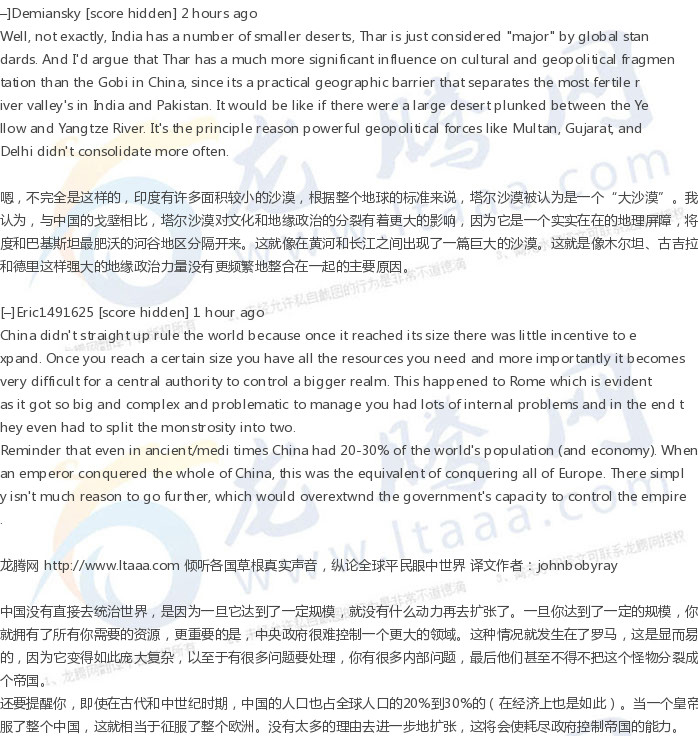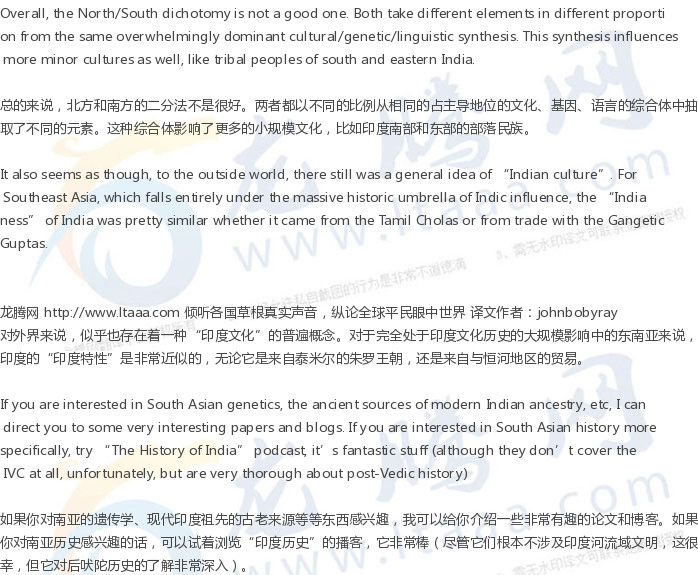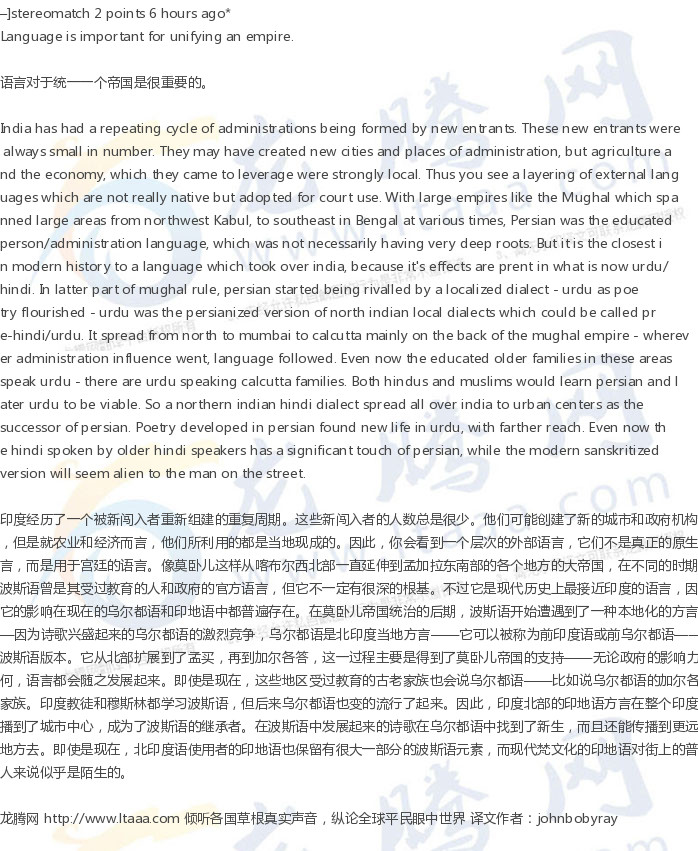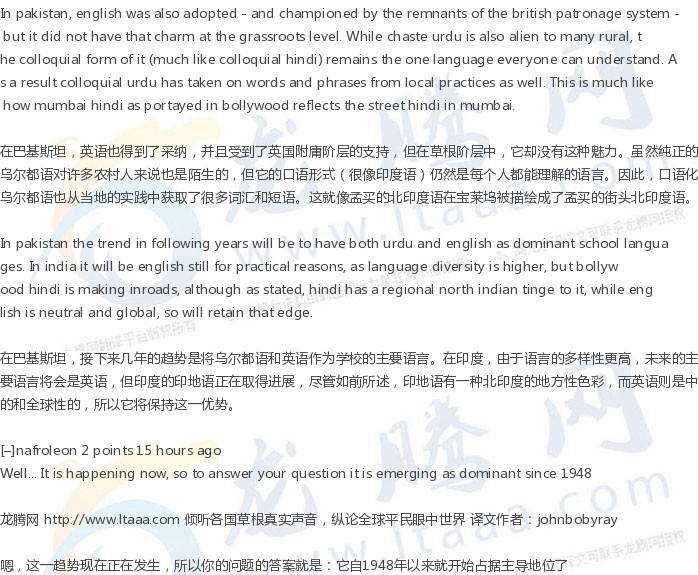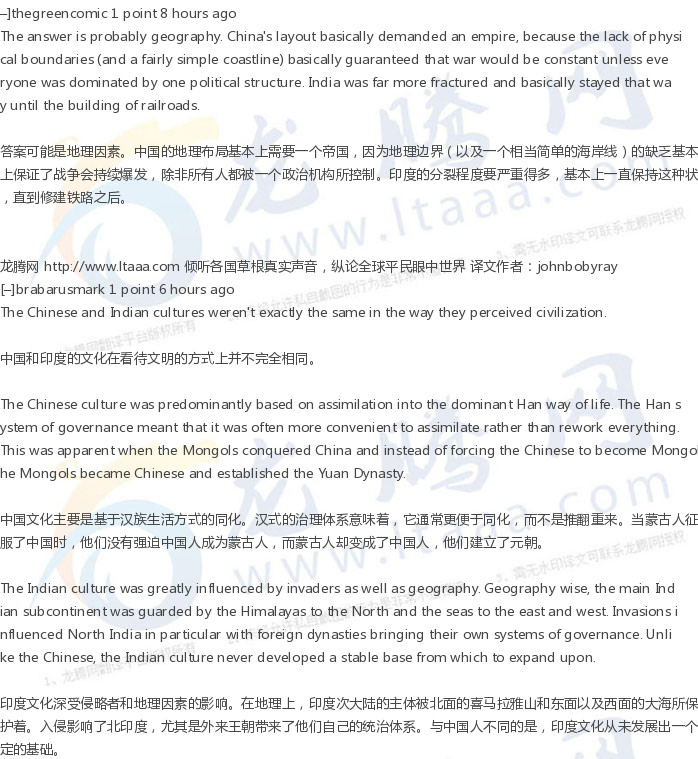为什么印度文化没有像汉文化那样成为主流文化呢?(下) [美国媒体]
我知道中国是如何通过中国化的方式成为一个几乎同质的拥有12亿人口的国家,但是为什么在很多方面都有类似的地形的印度却没有产生了与汉文化相当的成果呢?
Why didn’t an Indian culture emerge as the dominant culture like Han did in China due to Sinicization
为什么印度文化没有像汉文化那样成为主流文化呢?
I’m aware of how China became an almost homogenous nation of 1.2 bn people through Sinicization, but why didn’t India who in many ways shares similar geography produce an equivalent to Han?
我知道中国是如何通过中国化的方式成为一个几乎同质的拥有12亿人口的国家,但是为什么在很多方面都有类似的地形的印度却没有产生了与汉文化相当的成果呢?
I get why in Europe and the Middle East one super culture didnt form to dominate the west, mainly due to The Mediterranean sea, Sahara desert, and Syrian desert. But the Indian subcontinent, like China, isn’t broken up by a massive sea or desert like the west is. As well it had one of the few river valley civilizations and is one of the most fertile places in the world
我明白为什么在欧洲和中东没有产生一个超级文化来主导西方,其主要原因是地中海、撒哈拉沙漠和叙利亚沙漠。但是印度次大陆和中国一样,并没有像西方那样被巨大的海洋或沙漠所破坏。它也拥有为数不多的河谷文明之一,并且还是世界上最富饶的地方之一。
[–]Pit_shost 1 point 3 hours ago
across many more mountains, deserts
India barely has one desert, the Thar, and it's tiny compared to the whole country.
“要翻越很多的高山与沙漠”
印度只有一片沙漠,那就是塔尔沙漠,而且与整个国家的面积相比,它是微不足道的。
[–]RipperNash 3 points 8 hours ago
Many off the answers here are good from a historic point of view, but fail to explain the "reason" for said lack of unification. Yes, there were mountain ranges making life difficult for marching armies to go from the North to the South, but that can never be an adequate answer as armies have marched across many mountain ranges, and even entire deserts or oceans, before. Where there is a will, there is a way. I believe the answer lies in a lack of will. The reason for a lack of will is due to the dominant religious views in the Indian plains. The Vedic religion is highly focused on avoiding materialism and conquest. There are many holy myths and tales regarding kings who sought to conquer all, and were subsequently trimmed down by the Gods. I think this notion was very prent in the minds of the rulers who subsequently chose to improve internal strength rather than bolster the land acquisition via conquest. However, the earliest and oldest of Hindu Epics, the Ramayana, has the opposing view. It promotes conquest via the "Ashvamedha Yagna" concept but the later Epic "Mahabharatha" backtracks from that notion quite heavily and denounces conquest. I wonder what occured in the period between the two Epics that changed mindset so much. However, after the Mauryas, Buddhism took hold over India and it is totally non-violent and promoted total abandonment of the material world.. Until the Mughals and other Muslim invaders came in, Buddhism was quite strong in India, and the invaders first pillaged the Buddhist centers of power before targeting Hindus. Mughals, ofcourse, came the closest to creating a pan-India empire as their religion heavily promotes it, and were it not for the British and other western colonialists, Mughals may have succeeded too.
从历史的角度来看,这里的许多答案都是不错的,但它们都不能解释为什么印度缺少统一的“原因”。是的,有山脉使行军的军队很难从北方到达南方,但是这永远不能成为一个足够充分的答案,因为很多军队曾经成功地跨越了许多山脉,甚至是整片沙漠或海洋。哪里有决心,哪里就有办法。我相信答案在于缺乏意志。缺乏意志的原因是由于印度平原上占主导地位的宗教思想决定的。吠陀宗教高度关注于规避物质主义和征服。有许多关于国王的神话和传说,他们试图征服所有的人,但后来都被众神给收拾了。我认为这种观念在统治者的头脑中变得非常普遍,他们后来选择了增强内部力量,而不是通过征服来获取土地。然而,最早和最古老的印度史诗《罗摩衍那》中有着相反的观点。它通过“马祭”(马祭是印度吠陀时代的一种重要仪式。传统上,马祭是国王向生主和因陀罗求子的祭祀仪式,后来演变成国王为了获得上天对其王位的肯定的仪式。国王祭过天后,将祭马向东放行,国王则率领军队,征服祭马所到的地方,如果国王在一年内能征服祭马所到的大部分地方,即表示国王受到了天神的祝福)的概念来促进征服,但后来的史诗《摩诃婆罗多》却放弃了这一概念,并开始谴责征服行为。我想知道在这两部史诗之间发生了什么,从而改变了人们的思维方式。然而,在孔雀王朝之后,佛教占领了印度,它是完全非暴力的,并提倡彻底放弃物质世界。在莫卧儿人和其他穆斯林入侵者到来之前,佛教在印度是相当强大的,而入侵者在将矛头对准印度教徒之前,率先劫掠了佛教的权力中心。当然,莫卧儿人是最接近建立一个泛印度帝国的民族,因为他们的宗教大大有利于这一进程,如果不是英国和其他西方殖民主义者的闯入,莫卧儿人可能已经获得成功了。
Of course, India (the entire Subcontinent) is hugely heterogeneous in many regards. But it is also much more uniform than people think. Dravidian languages, one of two major language families in India (though there are many others), were the likely languages of the IVC, so all South Asians, north or otherwise, have a direct connection (it is essentially their “original” language).
当然,印度(整个印度次大陆)在许多方面都存在着巨大的差异。但它也比人们想象的更加统一。达罗毗荼语系是印度两个主要的语族之一(尽管还存在着很多其他的语族),它很可能是印度河流域文明的语言,所以所有的南亚人——无论是北方的还是其他地区的——都与它有着直接的联系(它本质上是他们的“原始”语言)。
All South Asians don’t speak Indo-European languages, like Hindi or Bengali, but they do all have genetic contributions from them, as well as cultural.
所有的南亚人都不会说印欧语,比如印地语或孟加拉语,但他们都有来自这些语言的基因元素,也有文化方面的遗存。
On the other hand, even the most strict Brahminical Hindu adherent is practicing a religion which has incorporated much of the more indigenous Harappan/Dravidian “folk religion”. Sanskrit, a language which only fairly recently descended into the modern tongues of North India (via various Prakrit dialects), also has a massive non-IE substratum.
另一方面,即使是最严格的婆罗门信徒也在践行一种宗教,这种宗教包含了许多本土的印度河流流域文明和达罗毗荼文明的“民间宗教”。梵语这样一种最近才进入印度北部现代语言中的语言(通过各种各样的古代印度语方言)也存在着大量的非印欧语下层元素。
[–]ajayrfhp 5 points 19 hours ago
There is plenty common across the different provinces of India. However, there were always different rulers in different parts of the country who were strong enough. I am from one of the 4 southern provinces in India. One of the kings from my province, ruled the eastern Indian coast, Sri Lanka and some parts of South East Asia. But he never ventured into Indian Mainland. We have the cultural heritage of about 7 kingdoms in these 4 provinces alone through different time periods. These different rulers and kingdoms have imparted different culture, traditions and languages. This lack of a single cohesive Indian king was the reason why the British were able to annexe India. Some kings aided the British, some were too scared, some did not care. Currently all provinces take their languages and identities pretty seriously and any push for a common language is strongly condemned from all provinces.
印度不同的邦有很多共同之处。然而,在这个国家的不同地区,统治者总是不同的。我来自印度南部的四个邦之一。我所在邦的一个国王曾经统治着东印度海岸、斯里兰卡和东南亚的一些地区。但他从未冒险进入印度大陆。在这四个邦中,我们拥有7个王国的文化遗产,它们分别来自不同的时期。这些不同的统治者和王国赋予了当地不同的文化、传统和语言。这种缺乏统一的印度国王的状况也是英国人能够吞并印度的原因。有些国王帮助了英国人,有些人非常害怕,有些人根本不在乎。目前,所有邦都非常严肃地对待自己的语言和身份认同,任何推动共同语言的努力都遭到了各邦的强烈谴责。
[–]hammersklavier 3 points 12 hours ago
States that unified India rarely lasted more than 100-200 years or so. The history of the subcontinent is one of periodic unification and fragmentation. As a consequence, the idea of a unified "Indian" culture never arose, in large part because there was never a centralized state that lasted long enough to promulgate it the way the Han, Tang, Song, Ming, and Qing dynasties all did in China.
That said, southern India is remoter and historically more fragmented than northern India. Most examples of major states that unified the bulk of the subcontinent (e.g. the Maurya, Kushan, and Mughal empires and Sultanate of Delhi) either developed in or later centered in the middle Ganges valley. It's quite common for the Indus and Ganges valley to be more unified than the Deccan Plateau, say, or the subcontinent's tip, historically.
统一印度的国家很少能持续超过100到200年。次大陆的历史是周期性的统一和分裂。其结果是,统一的“印度”文化从未出现过,这在很大程度上是因为,从来没有一个中央集权的国家能够持续足够长的时间来传播它,就像汉、唐、宋、明、清等王朝在中国所作的那样。
即便如此,印度南部甚至比印度北部地区更偏远,历史上也更加分散。大多数主要国家统一了印度次大陆的大部分地区(如孔雀王朝、贵霜帝国、莫卧儿帝国和德里苏丹国),这些国家要么是在中部的恒河流域发展起来的,要么是在后来将帝国的中心放置在这里的。从历史上看,印度河流域和恒河流域比德干高原或者是次大陆的尖端地点更统一。
[–]scijior 6 points 13 hours ago
I mean, the Maurya Empire (322-180 BCE) was pretty much as big as the Han Dynasty territory, with similar amounts of local pockets and such. So I don’t really know what you’re talking about (especially since there are something like 13 dialects [the most famous being Mandarin and Cantonese], and every region has a certain type of food and culture, like India).
我的意思是,孔雀王朝(公元前322年至180年)的规模几乎和汉朝一样大,所以也有类似数量的地方方言之类的东西。所以我真的不知道你在说什么(特别是因为中国也有13种方言,最着名的是普通话和广东话,每个地区都有某种类型的食物和文化,就像印度一样)。
[–]fromcjoe123 5 points 19 hours ago
Well I think the simplest answer is that the Indian subcontinent seldom had a unified state, and when it did, they never lasted as long as the contemporary Chinese empires.
Additionally, India is extremely ethnically diverse while the core areas of Han (the ethnic group, not Dynasty) China actually cover a massive amount of territory, which to me at least suggest mass conquests very early in the area prior the the initial recorded history of China. With such a large homogeneous population they could leverage, pushing South and West and subsequently homogenizing those conquered people would be less of a burden.
我认为最简单的答案是,印度次大陆很少有一个统一的国家,当它出现的时候,它们也从来没有像现在的中国帝国那样持久。
此外,印度的民族多样性非常丰富,而汉族(指的是民族群体,而非王朝)的核心地区实际上覆盖了其大量的领土,在我看来,这至少意味着在最初的历史记录之前,中国在该地区进行了早期的大规模征服。有了如此庞大的同质化人口可以加以利用,他们可以向南和向西推进,随后将被征服的人被同化,将不再成为一种负担。
[–]KubrickIsMyCopilot 2 points 9 hours ago
Part of an incomplete answer would have to do with an economic and political tactic that kept China stable as an imperial state: Control of rivers for transport and political rewards/punishments - aka, the hydraulic empire.
If a region rebelled, the Emperor could divert their branch of a river, cut off their water supply, kill their crops, and starve them. Meanwhile the water would be diverted to a neighboring region that would be rewarded for its loyalty in the process.
The geography of India may have made this type of control impractical in many areas, causing regions to be more economically isolated and politically more difficult to dominate. The wealth and political dominance of the Han people in China due to their imperial strength led to it becoming virtually synonymous with Chinese culture, but it was a much more diverse place before that control was established.
Since India never had a practical, stable basis for one ethnic group to thoroughly dominate the others, one never rose to sufficient prominence to redefine India as itself and gradually absorb others by interest and influence.
Because of the economic levers available to Chinese rulers, its history was a homogenizing process; because of the relative limitations of these levers in India, its history was much more of a mosaic process.
一个不完整的答案的一部分将与维系中国作为一个帝国国家稳定的经济和政治策略有关:控制河流运输和政治奖惩——也就是“水利帝国”。
如果一个地区发生反叛,皇帝可以让他们的河流改道,切断他们的水源,毁掉他们的庄稼,让他们挨饿。与此同时,水会被转移到邻近的地区,后者在这个过程中会得到回报。
印度的地理位置可能使这类的控制在许多领域变得不切实际,导致地区在经济上变得更加孤立,在政治上变得更难控制。中国汉族所拥有的财富和政治主导地位使其成为中国文化的代名词,但在这种控制建立之前,它也是一个更加多元化的地方。
由于印度从来没有一个实际的、稳定的基础来彻底统治其他民族,从来没有民族有足够的声望来重新定义印度,并通过兴趣和影响力逐渐吸收其他民族。
由于中国统治者的经济杠杆,其历史是一种均质化的过程;由于这些杠杆在印度的相对局限性,它的历史更像是一个嵌合突起的过程。
Prior to partition, it was the same language - muslims called it urdu and wrote it in persian/arabic script. Hindus used more sanskrit words, and would write in that script. But the man on the streets of delhi spoke the same language.
在出现分裂之前,这是同一种语言——穆斯林称其为乌尔都语,并以波斯文字和阿拉伯文字书写。印度教徒使用了更多的梵语单词,并在书面语言中应用到了它们。但是在德里街头的那些人说的也是同一种语言。
With partition, politics influenced the language further - as Pakistanis injected persian, arabic, english words, while Indians injected hindi words. In the absence of empire, bollywood played a great role in pushing hindi to other parts of india. Earlier bollywood scripts were mainly urdu, songs were urdu - that is because many script writers were muslim, and hindus of that era had learned persian in school. Modern bollywood now has more localized variants of the language emerging - and the more sanskritized hindi has emerged as more dominant, with other localized languages now emerging to give flavor.
随着分裂的发生,政治影响了语言的发展——巴基斯坦人注入了波斯语、阿拉伯语和英语词汇,而印度人则注入了印地语词汇。在没有帝国的情况下,宝莱坞在将印地语推广到印度其他地区的过程中发挥了重要作用。早期的宝莱坞剧本主要是乌尔都语创作的,歌曲都是乌尔都语,这是因为许多编剧都是穆斯林,那个时代的印度教徒在学校里学过波斯语。现代的宝莱坞有了更多的本地化版本的语言,而更加梵文化的印度语也变得更有统治力,其他本地化的语言也开始出现了。
Now in india, english is dominant as language of state - because there is no other local language that has universal coverage. For many english is a good alternative, since the other alternative hindi, even in its sanskritized extreme still reeks of north india, or at its urdu-ized form of mughal empire. So it is understandable why english maybe a reasonable alternative. Also for many areas which were historically opposed to the mughals, the english maybe preferable alternative.
现在在印度,英语作为一种官方语言获得了重要的地位,因为没有其他地方语言能够覆盖整个国家。对于许多人来说,英语是一个不错的替代选项,因为其他的选择,比如印地语,即使是在它被梵文化之后,仍然有着北印度的气味,或者是莫卧儿帝国乌尔都化的气味。所以说英语作为一个合理的选择是可以理解的。同样,在许多历史上反对莫卧儿帝国统治的地区,英语可能也是更好的选择。
The muslims of north india were historically more hostile to learning english as they saw them as usurpers of their muslim mughal heyday. This is the reason following 1857 mutiny against the british, when both muslims and hindus were one against the british, that the british developed a policy of separating the two - religious movements were encouraged both within the muslims and the hindus. In the aftermath of the mutiny, muslims avoided english education to their detriment, while hindus adopted it faster - that created additional schisms.
在历史上,印度北部的穆斯林对学习英语怀有更大额敌意,因为他们认为英语是他们穆斯林莫卧儿帝国全盛时期的“抢夺者”。这就是1857年发生反抗英国的暴乱的原因,当时穆斯林和印度教徒都反对英国,英国人便制定了一项政策,将这两种宗教运动分离开来,这一做法在穆斯林和印度教徒中都得到了支持。在暴乱之后,穆斯林拒绝接受英语教育,免受其伤害,而印度教徒则更快地采用了英语教育,这造成了更多的裂痕。
Thus for india, english arrived as an equally alien entrant, with none of the earlier baggage of north india/mughal, and was adopted less controversially as the neutral outside language.
因此,对于印度来说,英语作为一个同样的外部闯入者,它没有任何早期的北印度和莫卧儿语的包袱,作为中立的外部语言被采用的争议较少。
[–]ccc45p 1 point 15 hours ago
Instead of treating China as the norm and asking why India isn't like China it is more instructive to ask why China was more successful with spreading homogeneous culture. 2,000 years ago there was an extreme amount of cultural diversity with the Huaxia states mostly clustered around the Yellow River in the north. During the Han empire there was military expansion into the south, north and west. This part is widely known.
不要把中国当作常态,问为什么印度不像中国,更有启发意义的问题是,为什么中国在传播同类文化方面更成功。2000年前,华夏民族的文化多样性极为丰富,它主要集中在黄河以北的黄河沿岸。在汉朝期间,中国在南、北、西等方向都有军事扩张。这部分内容是众所周知的。
Chaos in the north, whether due to civil war or invasions by steppe hordes, including Mongols, Jurchens, Turks was historically a very strong driver of Huaxia migration into the southern regions. I believe this refugee based migration is the factor that most people overlook in the replacement process of indigenous cultures such as Tai, Austro-Asiatic, Miao-Yao, Austronesian, etc. In a cycle that repeated several times, the southern regions were flooded with refugees who intermarried and then in a couple hundred years, their connection to the north was reaffirmed with a new stable dynasty. Their integration into the region was made easy because of well understood long term underlying factors such as military expansion and conquest as well as cultural exchange and possibly enjoyed prestige status, similar to how most mainlanders fleeing to Taiwan were generally the richest, most educated elites with high influence under the KMT.
北方的混乱,无论是由于内战,还是北方游牧民族——包括蒙古人、女真人、突厥人的入侵——都是华夏移民进入南方地区的一个非常强大的驱动力。我相信这个基于逃难的移民过程是在它取代当地土着文化——比如泰文化、南亚语族文化、苗-瑶文化、南岛语族文化等文化的过程中大多数人都忽视了的因素。在一次循环中,这样的事情会重复出现几次,南部地区的难民涌入该地区,经过通婚,然后在几百年的时间里,他们与北方的关系又通过一个新的稳定的王朝得到了重新稳固。他们融入该地区是容易的,因为他们了解长期的潜在因素,如军事扩张和征服,以及文化交流和可能享有的特权地位,这类似于逃亡台湾的大多数大陆人一般是最富有的一群人,其中大多数都是受过教育的精英和处于国民党影响之下的人。
However, you must be careful with how you define a dominant culture. The Chinese did have a dominant culture that influenced East Asia greatly. The Indians too had a dominant culture that influenced South Asia, Southeast Asia, and parts of the Middle East (exchanges with Persia in particular). Both ancient civilizations were at the peak of dominance in their respective regions until the European colonial greed brought both to ruin.
然而,你必须注意你是如何定义一个主流文化的。中国人确实有一种占主导地位的文化,它影响到了东亚地区。印度人也有一种主导文化,它影响了南亚、东南亚和中东部分地区(尤其是与波斯的交流)。在欧洲殖民主义的贪婪带来毁灭之前,这两个古代文明都处于各自地区的主导地位。
[–]shrekchan 1 point 6 hours ago
I thought China became largely homogeneous, not form cultural domination, but rather the Han farmed Rice and other agriculture before everyone else in the area
我认为中国在很大程度上是同质化的,这不是因为文化上的主导地位,而是汉族在这个地区的其他所有人之前开始了种植水稻和其他农业活动
[–]Felis1 1 point 5 hours ago
Indian culture had gone all the way to Japan in the East, and to the edge of Turkey to the West too. But then, Indian culture never needed to convert people unlike Abrahami religions.
印度文化一直延伸到东部的日本,也一直延伸到西部的土耳其。但是,印度文化从来都不需要改变人们的信仰,不像亚伯拉罕诸教那样。
As a result, written language gave Chinese subjects a cultural unity that Europe and India lacked - both in terms of administrative communication and shared literary culture.
其结果是,书面语言给了中国主体一种欧洲和印度所缺乏的文化统一性——无论是在行政沟通还是共享文学文化方面。
版权声明
我们致力于传递世界各地老百姓最真实、最直接、最详尽的对中国的看法
【版权与免责声明】如发现内容存在版权问题,烦请提供相关信息发邮件,
我们将及时沟通与处理。本站内容除非来源注明五毛网,否则均为网友转载,涉及言论、版权与本站无关。
本文仅代表作者观点,不代表本站立场。
本文来自网络,如有侵权及时联系本网站。
图文文章RECOMMEND
热门文章HOT NEWS
-
1
Why do most people who have a positive view of China have been to ...
- 2
- 3
- 4
- 5
- 6
- 7
- 8
- 9
- 10
推荐文章HOT NEWS
-
1
Why do most people who have a positive view of China have been to ...
- 2
- 3
- 4
- 5
- 6
- 7
- 8
- 9
- 10

